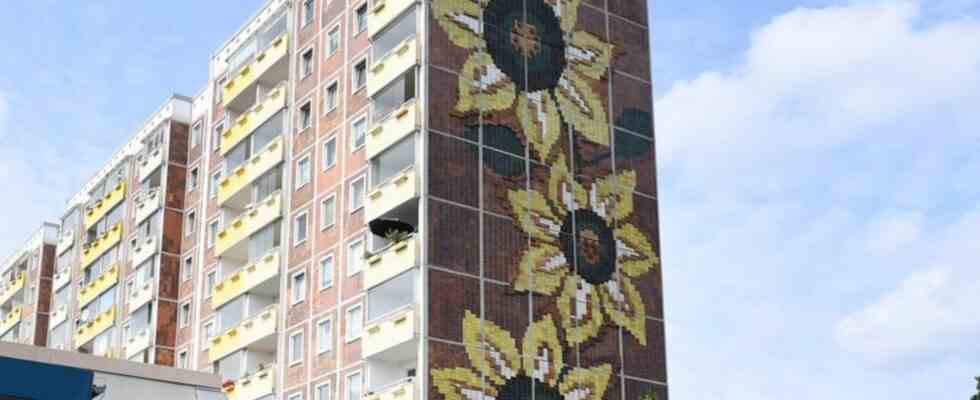Racist attacks
Lichtenhagen 1992 is also part of Rostock’s city history
The sunflower house in Rostock’s Lichtenhagen district. photo
© Stefan Sauer/dpa-Zentralbild/dpa
Rostock is preparing for a difficult commemoration that looks back on the racist attacks in Lichtenhagen 30 years ago. The Federal President will also come to the central event next week.
The racist riots in Lichtenhagen in 1992 are part of the city’s history, according to Rostock’s mayor, Steffen Bockhahn (left). “The memory of this must be kept alive and present so that such a terrible pogrom cannot be repeated,” he said, referring to the commemoration of the attacks 30 years ago.
At that time, from August 22 to 26, residents and neo-Nazis attacked the central reception center for asylum seekers and a hostel for Vietnamese workers and partly set them on fire to the applause of thousands of onlookers. The police could not get the situation under control. The riots are considered to be the worst racist attacks in post-war German history up to that point.
The event not only belongs to Rostock’s 804-year city history, but also to German history. Federal President Frank-Walter Steinmeier will therefore come to the Hanseatic city on August 25th. He will lay flowers at the site of the riots, at the sunflower house, visit the Buddhist-Vietnamese temple and give a speech at a memorial service in the Rostock town hall in the evening. Prime Minister Manuela Schwesig (SPD) is also coming to the city on the day.
Effects of the pogrom in focus
To commemorate the pogrom, its causes and consequences, associations, institutions and the city together with partners developed different formats in Rostock. In addition to film screenings and photo exhibitions, the program also includes a city tour of Lichtenhagen, which focuses on the history, the effects and how society dealt with the pogrom.
On August 25, school classes are invited to the Stadthalle to deal with historical and current issues connected to the events of August 1992 from various perspectives. The city has set up a website at www.rostock.de/commemoration, where dates, event information and further links on the subject can be found.
The Amadeu Antonio Foundation, which is under the patronage of the former Bundestag President Wolfgang Thierse (SPD), also recently commemorated other places. “In the 1990s, neo-Nazis repeatedly attacked asylum seekers and people they regarded as alien or less valuable – it was enough not to share their worldview,” the foundation says. Rostock, Hoyerswerda, Mölln and Solingen are just some of the places where such attacks took place. “Many of the perpetrators of that time never had to justify their actions and were not legally prosecuted,” criticized the foundation’s managing director Timo Reinfrank.
Rostock’s incumbent mayor, who is also a historian, emphasized that there is certainly far more than one explanation for what happened in Lichtenhagen back then. You have to see a lot in the time and the circumstances of that time. “You will see that it was a catastrophe that was announced, but that cannot be excused. What happened at the end of August 1992 cannot be excused.”

